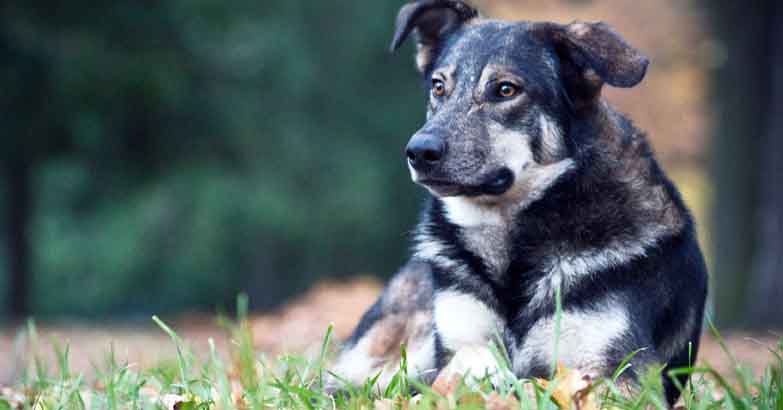Stomach cancer isn’t a very common cancer in dogs, accounting for less than 1% of canine cancers. But it can be a deadly one because it often shows no symptoms until the disease is in advanced stages.
What Causes Stomach Cancer In Dogs?
While specific causes of stomach cancer aren’t known, there are some risk factors:
- Age: Stomach cancer is more common in dogs age 9 or older, including both benign and malignant tumors
- Gender: Males appear more affected than females
- Breed: Some breeds are more prone to stomach cancer. These include Staffordshire Bull Terriers, Chow Chows, Rough Collies, and Belgian Shepherds. But any breed can get stomach cancer.
Like any other cancer, lifestyle factors like diet, drugs and vaccines, environmental toxins and stress are key to managing your dog’s disease risks.
Types Of Stomach Cancer
Dogs can get benign or malignant stomach tumors, and they can spread to other parts of your dog’s body. Untreated tumors can disrupt stomach function and may heighten the risk of ulcerated tumors and gastric obstructions.
Ulcerating Tumors
These can cause a hole or perforation in the stomach, leading to peritonitis, which can be fatal.
Malignant Tumors
Most dog stomach cancers are malignant. There are a few different types of malignant stomach tumors …
- Gastric adenocarcinomas, the most common, can affect different areas of the digestive tract
- Leiomyosarcomas on the stomach and intestinal muscles
- Alimentary or gastrointestinal ymphomas, which develop in the lymphocytes (immune system cells)
Mast Cell Tumors
Mast cells are cells throughout the body that fight viruses and parasites, and they’re part of the allergy and immune system response. Mast cell tumors are usually on the skin, but can occur in the stomach. Benign mat cell tumors can be removed with surgery, but some are more aggressive and can invade other parts of the body.
Benign Tumors
Benign tumors are less common but if they grow, can interfere with stomach function.
Signs Of Stomach Cancer
Unfortunately the symptoms of stomach cancer in dogs appear slowly over time, and often aren’t well recognized because they’re similar to other disease symptoms. The most common signs include:
- Vomiting, especially with the appearance of coffee grounds or blood (usually due to a ruptured tumor)
- Drooling (due to nausea)
- Black stools
- Reduced appetite
- Weight loss
- Lack of activity
- Abdominal pain
- Whining, yelping or growling due to pain
- Oversensitive to touch
- Rapid breathing
- Peeing or pooping indoors
- Licking or scratching excessively
How Vets Diagnose Dog Stomach Cancer
Stomach cancer is usually diagnosed in response to some of the above symptoms. Vets will start with a physical exam, but will likely follow up with x-rays using a constrast agent to coat the digestive tract and provide a better view.
Endoscopy is another procedure that involves inserting a tube with a video camera through the mouth ad into the stomach. If endoscopy reveals a tumor, a biopsy is often done at the same time.
Other tests will usually include complete blood count ad blood chemistry analysis, urinalisys, chest x-rays and abdominal ultrasounds. These tests won’t show whether the cancer has spread, however.
Conventional Treatment Options
Here’s the conventional veterinary approach to stomach cancer …
Surgery
Stomach cancer treatments will often begin with surgery to remove tumors, as well as whatever part of the stomach is impacted, and sometimes part of the small intestine.
VeterinarianJudy Jasek DVM, who specializes in natural cancer treatments, warns that surgery may remove the tumor but it doesn’t do anything to get rid of the underlying cause of the cancer.
And in the case of stomach cancer, even conventional veterinarians will warn that the tumors often come back after surgery.
Chemotherapy
Chemo is often recommended for malignant stomach tumors, especially if there’s a risk of spread, or they have already spread to other body parts. Chemo may be suggested with or without prior surgery.
Radiation
Radiation can be used for localized tumors that can’t be removed with surgery. Most dogs are sedated for radiation because they have to keep completely still.
Natural Treatments For Stomach Cancer In Dogs
Any cancer can be difficult to treat with conventional therapies described above, and they all involve risky side effects and often invasive procedures for your dog.
Natural treatments can often be as effective in managing cancer in dogs, without stressing your dog or affecting his enjoyment of activities.
However, natural treatments for any kind of cancer can be used in additional to conventional treatment options, or as standalone therapies.
If you choose natural treatments, find a holistic practitioner with experience in treating cancer. With natural therapies. Pharmaceutical drugs or surgery are usually only used when needed for pain management.
Most natural treatments will use the foundation of a whole food diet, plus natural remedies that support the body’s own healing ability, aiming to preserve your dog’s quality of life as far as possible.
Other remedies may include herbs or homeopathy, plus options like medicinal mushrooms, CBD, curcumin/turmeric, mistletoe, ozone or essential oils.
Click on this link to read more about natural cancer treatments.
What To Feed A Dog With Stomach Cancer
As with any cancer in dogs, feeding a whole food, low starch diet is crucial. Avoid kibble which is high in starchy carbohydrates that convert to sugar and feed cancer cells.
As your holistic vet to help you with the best diet for your individual dog’s condition. However, general guidelines to optimize health in any dog are:
- Avoid all kibble and starchy foods
- Use whole-food sourced supplements and avoid synthetic vitamins and minerals (often found in pre-made dog food, even raw foods)
- Feed organic produce, pasture raised meats and wild-caught fish, and avoid factory-farmed animals
- include healthy fats, including omega-3 fatty acids, which have anti-inflammatory effects
- Avoid dairy, which can be inflammatory for some dogs
Here are Dr Deva Khalsa’s top foods for preventing cancer in dogs. These same foods can benefit your dog and support him even if he already has cancer.
Stomach Cancer In Dogs Life Expectancy
Malignant stomach tumors don’t usually have good outcomes, especially in cases of aggressive stomach cancer in dogs.
Gastric adenomas have often metastasized when they’re found, and even if surgically removed, usually grow back. Expected survival time with conventional treatment is estimated at less than 6 months.
Gastric leiomyosarcomas can sometimes be surgically removed if diagnosed in early stages, but the prognosis is greatly reduced when the disease is already advanced.
Always keep in mind the Dog Cancer Vet Dr Demian Dressler’s advice on how to prevent cancer in dogs. With the relatively low incidence of stomach cancer in dogs, hopefully your dog can avoid it.









